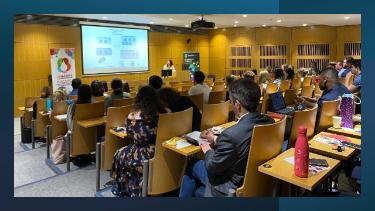The EU invests in a promising new COVID-19 therapy
Since the beginning of the coronavirus pandemic, over 2.7 million hospitalisations of COVID-19 have occurred in Europe alone[1]. About 14% of those with mild and moderate symptoms have developed severe symptoms and been eventually admitted into Intensive Care Units (ICUs)[2].
A challenge for Intensive Care Units
Unfortunately, the most common treatments for the first two stages of the illness (remdesivir and antibody therapy) have not shown the desired effect nor stopped the progression to critical stages. Adding to this, the slow progress of vaccination programmes in many European countries and the emergence of new variants, a therapeutic breakthrough is in dire need.

COVend as a solution for patients suffering from SARSCOV-2 infection during mild and moderate stages.
The COVend project
Although the COVID-19 pandemic has changed our way of living for almost two years, there is still no direct therapy currently available, but rather it is limited to symptom control. As a reaction to this, Horizon Europe has newly funded the COVend project, which aims to stop the COVID-19 progression to severe by delivering a new effective treatment option for patients suffering from the infection during mild and moderate stages. This multidisciplinary consortium unites 17 partners from 13 European countries with expertise from different disciplines, including (cell) biology, ICT expertise for AI based evaluations, pharma, economics, and social sciences, as well as clinical expertise. In addition to reducing the burden on patients, their families and the healthcare sector, COVend’s solution would help provide ICU beds for non-COVID patients requiring immediate interventions, such as heart or cancer surgeries. COVend’s mission is to achieve these results by testing the promising candidate FX06, a peptide that targets the endothelium, which is a thin membrane that lines the inside of the heart and blood vessels, and that appears to be affected by the virus. The consortium, coordinated by Prof. Kai Zacharowski, will study the influence of COVID-19 on endothelial cells and the potential protective effect of FX06, by applying OMICS technologies, generating new algorithms and open-source software for data analytics and modelling, and developing health economic models that assess the benefits and cost-effectiveness of the therapy.
The COVend Consortium
This multidisciplinary consortium unites 17 partners from 13 European countries:
- Johann Wolfgang Goethe-Universität Frankfurt
- accelopment Schweiz AG
- European Society of Anaesthesiology and Intensive Care
- Fraunhofer Institute for Translational Medicine and Pharmacology
- F4-Pharma GmbH
- Tampere University, Faculty of Medicine and Health Technology
- University College Dublin, Systems Biology Ireland (Prof. Günther Eissner)
- University Medical Center Groningen, Department of Health Sciences
- University Medical Center Groningen, Department of Health Sciences
- Intelligent Data Analytics GmbH & Co. KG
- University Hospital Würzburg
- ASST Fatebenefratelli Sacco – Luigi Sacco Hospital
- Ospedale S. Maria della Misericordia, University of Perugia
- Hospital of Lithuanian University of Health Sciences Kaunas Clinics
- Hospital Universitari de Bellvitge
- Carol Davila University of Medicine and Pharmacy
- Centro Hospitalar e Universitario de Coimbra E.P.E.
- Assistance Publique Hopitaux de Paris
SBI's Prof. Günther Eissner is one of the COVend consortium partners. “This cutting-edge project bridges the long-standing expertise we have developed in endothelial cell (patho)biology with world-class dry lab research on drug effects performed at our institute," Eissner said.
[1] World Health Organisation. WHO COVID 19 Detailed Surveillance Data Dashboard (last accessed on 05.11.2021)
[2] COVID-NET. Laboratory-Confirmed COVID-19-Associated Hospitalizations (last accessed on 05.11.2021)

